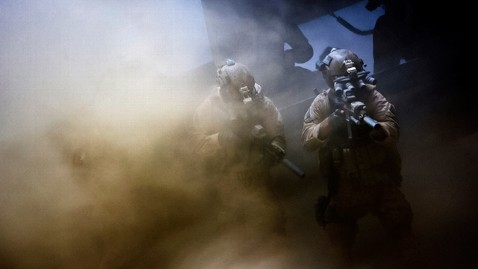
(United States Mint/Wikimedia Commons)
White House Press Secretary Jay Carney today flatly ruled out any negotiations with Congress over raising the debt ceiling, but there’s one odd-ball solution he would not rule out: minting trillion dollars coins to pay off the debt.
“There is no Plan B. There is no backup plan. There is Congress’s responsibility to pay the bills of the United States,” White House Press Secretary Jay Carney told reporters at the daily White House briefing.
READ: $1-Trillion Coins: The Ultimate Debt Ceiling End-Around?
Asked if the administration would rule out minting trillion dollars coins if Congress fails to act, Carney deflected saying “you could speculate about a lot of things.”
“Nothing needs to come to these kinds of… speculative notions about how to deal with a problem that is easily resolved by Congress doing its job, very simply,” he added.
Pressed further on why they won’t offer a clear yes-or-no answer to the question, Carney referred questions to the Treasury Department.
“I answered it thoroughly,” he later joked. “And I have no coins in my pocket.”
Some have suggested the President could invoke the 14th Amendment to the Constitution – which states, “the validity of the public debt of the United States … shall not be questioned” – and ignore the debt ceiling altogether. On that question, Carney has offered a straight answer: the 14 Amendment does not apply to the debt ceiling.
“We just don’t believe that it provides the authority that some believe it does,” Carney said.
The trillion-dollar-coin idea has been floated by, among others, an economist at the American Enterprise Institute.
Here’s our full Q and A:
KARL: I heard you unequivocally rule out using the 14th Amendment on the debt ceiling. I heard you unequivocally rule out negotiating with Congress. But you did not rule out this trillion-dollar coin idea. So can I ask you just a yes-or-no question? Does the White House rule out the idea of minting trillion-dollar coins as a way of dealing with the debt ceiling?
CARNEY: I would refer you to Treasury for the specifics of this question. I can tell you that the president does not believe that there is a backup plan or a plan B or an off-ramp. The only viable option here is Congress to fulfill its — that Congress fulfills its responsibility and ensures that the United States of America pays its bills, as it has always paid its bills throughout its history.
KARL: But why have we ruled out the 14th Amendment and not ruled out the trillion-dollar coin idea?
CARNEY: Again, I can tell you that there are no back-up plans. There are no plan B’s. I’d refer you to the Treasury.
–
KARL: Jay, the speaker of the House has made it perfectly clear that he is willing to increase the debt ceiling, but the principle is for every dollar the debt ceiling is increased, a dollar of spending must be cut. Given that you’re saying that the White House will not negotiate on raising the debt ceiling, are you willing to accept that principle from the speaker, a dollar in cuts for every dollar increase?
MR. CARNEY: I think the president’s been very clear that his absolute principle is that we need to reduce our deficit in a balanced way that does not shift all the burden, through cuts exclusively, on senior citizens, on families who have disabled children, on families who are trying to send their kids to school. That’s just unacceptable.
You know, one of the things we learned in the process that we just went through late in — late last year is that when it comes to specificity, we never saw any specificity from Republicans in terms of how exactly they would achieve the kind of sweeping cuts that they say they want and out of whose — you know, from whom would they demand that payment.
And what the president has been very clear about is he will not negotiate on Congress’ responsibility to pay its bills. He will negotiate and is willing to compromise, as he has demonstrated repeatedly, when it comes to moving forward in a balanced way to reduce our deficit. We have to deal with the sequester. We have to deal with a variety of budgetary and economic and fiscal challenges.
But he will not negotiate over the debt ceiling. And the threat itself is a problem, as we saw in the summer of 2011. The binary choice that Republicans seem to want to present to the American public is either we gut Medicare and Social Security or we tank the global economy. I’m not a communications director for the speaker of the House or the Senate minority leader, but I would think selling that would be very hard.
KARL: But help me understand how this works. You say you will not negotiate on this issue. They’ve put out a principle, so they produce something — and they say they will — that cuts a dollar for every dollar increase. And you’re saying you won’t negotiate on that?
MR. CARNEY: Have you seen that?
KARL: Well, this is what they say they are going to go forward.
MR. CARNEY: Well, I mean, you know –
KARL: So either –
MR. CARNEY: — words are not actions, and there has been, at — to this date, very little specificity, you know, since we — since the Ryan plan, which itself was lacking in specifics. And if their — if their position is we’re going to voucherize Medicare or tank the global economy, they should say so. That is unacceptable to the American people. It’s certainly unacceptable to the president.
Look, here’s the thing. Congress has the authority to authorize money, right, not the president. Congress racked up these bills. Congress has to pay these bills. We are very interested in a discussion and negotiation about getting our fiscal house in order. This president has already signed into law over $2 trillion in deficit reduction. He is eager to do more in a balanced way.
But it is not appropriate to — in this president’s view — to say that if I don’t get what I want, I’m not going to raise the debt limit. That is basically saying, I will abandon the history of the United States maintaining the full faith and credit of its currency and its — and its treasury by refusing to pay bills because I didn’t get what I want politically.
And that’s just not acceptable to the president.
KARL: I’m not sure I understand how that works — you’re not going to negotiate at all? –
MR. CARNEY: We’re not going to negotiate. Congress has a — if Congress wants to give the president the responsibility to raise the debt ceiling, he would take it, as we saw when — in 2010 or — I forget, there have been so many of these confrontations — in — when — in 2011 when the so-called McConnell plan was adopted, you know. But they assigned themselves this responsibility. They need to be — the fact that they, you know, assigned it to them is something that they have to deal with. They assigned it to themselves, they need to act, and they need to, without drama or delay, raise the debt ceiling. We still have — there is plenty of opportunity outside of threatening the full faith and credit of the United States to debate fundamental differences over our economic and fiscal policy proposals, but it is not wise to do that around raising the debt ceiling, not wise to do it around the simple principle that we, the United States of America, pay our debts.










